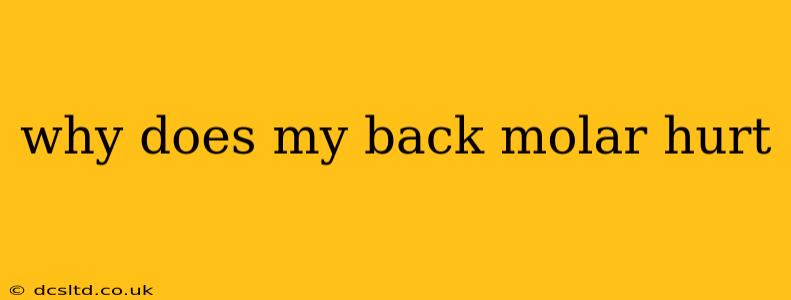A throbbing pain in your back molar can be incredibly disruptive, making eating, sleeping, and even talking uncomfortable. This guide explores the various reasons why your back molar might be hurting, helping you understand the potential causes and when to seek professional dental care.
Common Causes of Back Molar Pain
Several factors can contribute to pain in your back molar. Understanding these potential causes is the first step towards finding relief.
Cavities (Dental Caries):
This is perhaps the most common culprit. Bacteria in your mouth produce acids that erode tooth enamel, leading to cavities. As the cavity progresses, it reaches the dentin (the layer beneath the enamel), causing sensitivity and eventually, sharp, persistent pain, especially when exposed to hot or cold temperatures, sweets, or pressure.
Gum Disease (Periodontitis):
Inflammation and infection of the gums can spread to the supporting structures of your teeth, including the ligaments and bone surrounding the molar. This can lead to pain, sensitivity, and even tooth loss if left untreated. Symptoms often include swollen, red gums that bleed easily.
Abscess:
A dental abscess is a pocket of pus that forms at the root of the tooth or in the gums. This is usually caused by an infection, often stemming from a neglected cavity or gum disease. Abscesses cause severe, throbbing pain, often accompanied by swelling and fever. This requires immediate professional attention.
Cracked Tooth:
A crack in your molar, sometimes invisible to the naked eye, can expose the inner layers of the tooth to bacteria and food particles, leading to significant pain, particularly when chewing. The pain might be intermittent or constant, depending on the severity and location of the crack.
Bruxism (Teeth Grinding):
Grinding your teeth, often unconsciously during sleep, puts significant pressure on your molars, causing them to become sensitive and painful. Over time, this can lead to wear and tear, chipping, and even fractures.
Sinus Infection:
Because the roots of your upper molars are close to the maxillary sinuses, a sinus infection can sometimes refer pain to the teeth. This pain is often accompanied by other sinus infection symptoms such as nasal congestion, pressure, and headaches.
Impacted Wisdom Tooth:
The eruption of wisdom teeth can cause pain and pressure on adjacent molars. If the wisdom tooth is impacted (partially or fully trapped beneath the gum line), it can cause significant pain and inflammation.
What to Do if Your Back Molar Hurts
If you're experiencing pain in your back molar, here's what you can do:
- Rinsing: Gently rinse your mouth with warm salt water to help cleanse the area and reduce inflammation.
- Over-the-Counter Pain Relief: Use ibuprofen or acetaminophen to manage pain and inflammation. Never self-medicate for a prolonged period; consult a dentist.
- Avoid Irritants: Stay away from hot, cold, sweet, and acidic foods and drinks that can aggravate the pain. Chew on the opposite side of your mouth.
- Schedule a Dental Appointment: This is crucial. Ignoring dental pain can lead to serious complications. A dentist can diagnose the problem accurately and recommend appropriate treatment.
When to See a Dentist Immediately
Seek immediate dental attention if you experience:
- Severe, throbbing pain: This indicates a potential abscess, requiring urgent treatment.
- Swelling in the face or jaw: This is a sign of infection that needs immediate attention.
- High fever: Fever often accompanies a severe dental infection.
- Difficulty opening your mouth: This could indicate a more serious underlying issue.
This information is intended for general knowledge and does not constitute medical advice. Always consult a qualified dentist for diagnosis and treatment of any dental problem. Early intervention is key to preventing further complications and preserving your oral health.
